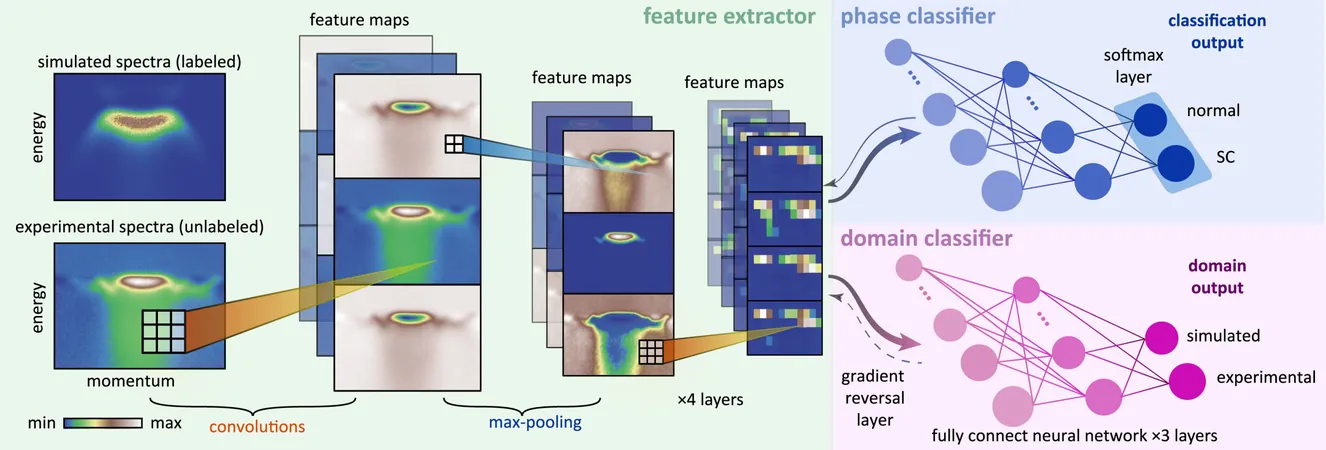
Revolutionizing Superconductors: The AI Breakthrough You Need to Know About!
2025-04-10
Author: Wei Ling
AI Transforms the Search for Superconductors!
Artificial intelligence has just turbocharged the quest for advanced superconductors! A groundbreaking study has revealed that AI can reduce the identification time of complex quantum material phases from months to mere minutes. The implications? A potential leap in the research of low-dimensional superconductors.
Led by an Elite Team of Researchers!
The research, a collaboration between theorists at Emory University and experimentalists at Yale, features prominent figures like Fang Liu and Yao Wang from Emory’s Department of Chemistry along with Yu He from Yale's Department of Applied Physics.
Machine Learning Meets Quantum Materials!
By employing machine-learning techniques, the team has successfully identified spectral signals that reveal phase transitions in quantum materials, where electron behavior becomes wildly unpredictable. Xu Chen, the lead author of the study, states, "Our method provides a rapid and precise insight into highly complex phase transitions at virtually zero cost. This could fast-track breakthroughs in superconductivity!"
Overcoming Data Challenges!
One major hurdle in applying machine learning to quantum materials lies in the insufficient high-quality experimental data required for model training. The researchers tackled this by using high-throughput simulations to create vast datasets, which they merged with limited experimental data to forge a powerful AI framework.
Bridging Worlds: From Simulations to Real Experiments!
Liu draws an interesting analogy: "It's like training self-driving cars. You can test them in Atlanta, but they must perform reliably anywhere, like New Haven. We aim to make this learning transferable and comprehensible." Their innovative framework enables AI models to detect phase transitions from single spectral snapshots by leveraging insights from simulations.
Unraveling Quantum Fluctuations!
Quantum materials present intriguing behaviors, where particles like electrons exhibit properties that challenge classical physics. One stunning characteristic is entanglement, where changes in one particle instantly affect another, regardless of distance. However, studying these fluctuations adds layers of complexity that traditional physics struggles to manage.
The Quest for High-Temperature Superconductivity!
Superconductivity—the phenomenon of materials conducting electricity without energy loss—was first discovered in 1911. Yet, significant advancements in this field, like high-temperature superconductivity found in cuprate compounds, have led scientists to pursue materials that can function as superconductors at room temperature. Achieving this could revolutionize everything from energy grids to advanced computing.
A New Dawn for Machine Learning in Physics!
The researchers’ machine-learning approach is not just innovative; it's practical, allowing for quick exploration of new quantum materials. By linking experimental data with extensive simulations, they've created an adaptable model that recognizes key transitions with impressive accuracy.
What’s Next?
The Yale physicists tested this AI model experimentally on cuprates, achieving nearly 98% accuracy in distinguishing superconducting from non-superconducting phases. This new method, grounded in characteristic spectral features, promises to revolutionize high-throughput analyses of a variety of materials.
A Future of Efficiency and Discovery!
As scientists race towards harnessing the full potential of superconductors, this marriage of AI and quantum physics may lead to unprecedented discoveries, advancing technology and energy efficiency like never before.




 Brasil (PT)
Brasil (PT)
 Canada (EN)
Canada (EN)
 Chile (ES)
Chile (ES)
 Česko (CS)
Česko (CS)
 대한민국 (KO)
대한민국 (KO)
 España (ES)
España (ES)
 France (FR)
France (FR)
 Hong Kong (EN)
Hong Kong (EN)
 Italia (IT)
Italia (IT)
 日本 (JA)
日本 (JA)
 Magyarország (HU)
Magyarország (HU)
 Norge (NO)
Norge (NO)
 Polska (PL)
Polska (PL)
 Schweiz (DE)
Schweiz (DE)
 Singapore (EN)
Singapore (EN)
 Sverige (SV)
Sverige (SV)
 Suomi (FI)
Suomi (FI)
 Türkiye (TR)
Türkiye (TR)
 الإمارات العربية المتحدة (AR)
الإمارات العربية المتحدة (AR)